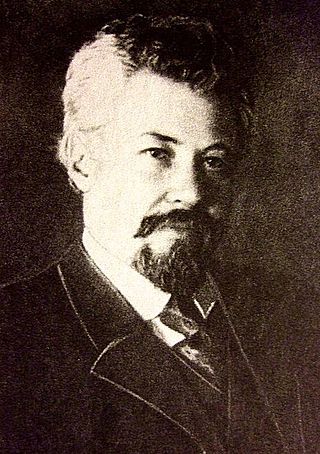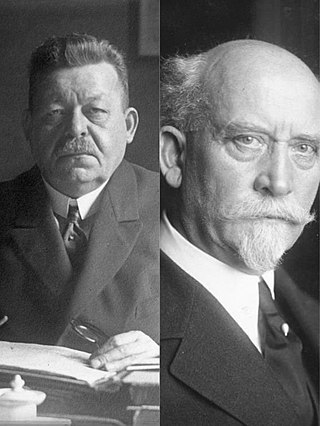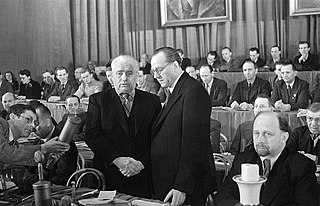
The Volkskammer was the supreme power organ of the German Democratic Republic. It was the only branch of government in the state, and per the principle of unified power, all state organs were subservient to it.

The original Constitution of East Germany was promulgated on 7 October 1949. It was heavily based on the Weimar Constitution and nominally established the GDR as a liberal democratic republic. In 1968, the East German government adopted a new, fully Communist constitution that was based on Marxism–Leninism, political unitarism, and collective leadership. There were further amendments to the 1968 constitution in 1974. With the political events of 1989, there were attempts to draft a new constitution for East Germany, but these efforts never materialized due to the dissolution of East Germany and the accession of its states into the neighboring Federal Republic.

The National-Democratic Party of Germany was an East German political party that served as a satellite party to the Socialist Unity Party of Germany (SED) from 1948 to 1989, representing former members of the Nazi Party, the Wehrmacht and middle classes. It should not be confused with the far-right National Democratic Party of Germany, which was a party in West Germany and continues as a minor non-governmental party in the modern united Germany.
The National Front of the German Democratic Republic was officially an alliance of parties and mass organisations (1950–1990). In fact, only one party held power in the GDR, namely the communist SED. The National Front was an instrument to exercise control over the other parties and organisations. The precursor of the National Front was the Democratic Bloc.
These are lists of political office-holders in East Germany. The political leadership of East Germany was distributed between several offices. However, until the Volkskammer removed a section in the GDR's constitution guaranteeing their monopoly on political power on 1 December 1989, the Socialist Unity Party of Germany (SED) held ultimate power and authority over state and government. Thus, the head of the SED's Politburo of the Central Committee was the de facto leader of the country.

Elections in Indonesia have taken place since 1955 to elect a legislature. At a national level, Indonesian people did not elect a head of state – the president – until 2004. Since then, the president is elected for a five-year term, as are the 575-member People's Representative Council, the 136-seat Regional Representative Council, in addition to provincial and municipal legislative councils.

Elections to the Russian Constituent Assembly were held on 25 November 1917, although some districts had polling on alternate days, around two months after they were originally meant to occur, having been organized as a result of events in the February Revolution. They are generally recognised to be the first free elections in Russian history. The dissolution of the Constituent Assembly was also approved by the Left Socialist Revolutionaries and anarchists; both groups were in favour of a more extensive democracy.
Elections in Germany include elections to the Bundestag, the Landtags of the various states, and local elections.

Elections in North Korea are held every four-to-five years for the Supreme People's Assembly (SPA), the country's national legislature, and every four years for Local People's Assemblies. Critics argue that North Korean elections are show elections which lack competition and allow the government to claim a veneer of legitimacy, with all candidates preselected and no option to write in other candidates. According to official reports, turnout is near 100%.

Federal elections were held in Germany on 19 January 1919, although members of the standing army in the east did not vote until 2 February. The elections were the first of the new Weimar Republic, which had been established after World War I and the Revolution of 1918–19, and the first with women's suffrage. The previous constituencies, which heavily overrepresented rural areas, were scrapped, and the elections held using a form of proportional representation. The voting age was also lowered from 25 to 20. Austrian citizens living in Germany were allowed to vote, with German citizens living in Austria being allowed to vote in the February 1919 Constitutional Assembly elections.

General elections were held in East Germany on 18 March 1990. They were the first free elections in that part of Germany since 1932, and were the first and only free elections held in the state before German reunification. The Alliance for Germany, led by the new East German branch of the centre-right Christian Democratic Union (CDU), won 192 seats and emerged as the largest bloc in the 400-seat Volkskammer, having run on a platform of speedy reunification with West Germany. The East German branch of the Social Democratic Party (SPD), which had been forced to merge with the Communist Party of Germany (KPD) in 1946 and refounded only six months before the elections, finished second with 88 seats despite being widely expected to win. The former Socialist Unity Party of Germany, restyled as the Party of Democratic Socialism (PDS), finished third with 66 seats.
Vote early and vote often is a generally tongue-in-cheek phrase used in relation to elections and the voting process. Though rarely considered a serious suggestion, the phrase theoretically encourages corrupt electoral activity, but is used mostly to suggest the occurrence of such corruption.

Constitutional Convention elections were held in Iran on 3 and 4 August 1979. The result was a victory for the Islamic Republican Party. There were 10,784,932 votes cast in the elections, marking 51.71% turnout. Of all members elected, 68% were clerics.
General elections were held in East Germany on 8 June 1986. 500 deputies were elected to the Volkskammer, with all of them being candidates of the single-list National Front. 703 Front candidates were put forward, with 500 being elected and 203 becoming substitute deputies. At its first session on 16 June, the Volkskammer re-elected Willi Stoph as Chairman of the Council of Ministers, while Erich Honecker, General Secretary of the ruling Socialist Unity Party, was also re-elected Chairman of the State Council.
General elections were held in East Germany on 17 October 1976. Out of 591 candidates of the single-list National Front for the 500-seat Volkskammer, 500 were elected from the highest number of votes received in each of the allocated lists, and 91 who lost their elections became substitute deputies. At its first session on 29 October, the Volkskammer elected Willi Stoph as Chairman of the Council of Ministers, while Erich Honecker, General Secretary of the ruling Socialist Unity Party, was elected Chairman of the Council of State. The allocation of seats remained unchanged from previous elections.
General elections were held in East Germany on 17 October 1954. It was the second election to the Volkskammer, which had 466 deputies; due to the four-power status of the city of Berlin, the 66 deputies from East Berlin were indirectly appointed by the East Berlin magistrate.

Elections for the Third German People's Congress were held in East Germany on 15 and 16 May 1949. Voters were presented with a "Unity List" from the "Bloc of the Anti-Fascist Democratic Parties," which was dominated by the Communist-leaning Socialist Unity Party of Germany (SED). The ballot was worded "I am for the unity of Germany and a just peace treaty. I therefore vote for the following list of candidates for the Third German People's Congress," with voters having the options of voting "yes" and "no". In much of the country, the vote was not secret.

The East German branches of the Communist Party of Germany (KPD) and the Social Democratic Party of Germany (SPD) merged to form the Socialist Unity Party of Germany (SED) on 21 April 1946 in the territory of the Soviet occupation zone. It is considered a forced merger. In the course of the merger, about 5,000 Social Democrats who opposed it were detained and sent to labour camps and jails.
Bertram Wieczorek is a German physician and former politician (CDU).

Käte Niederkirchner was a German politician and pediatrician. In 1967 she became the youngest member of the East German parliament ("Volkskammer"). Her life was impacted by having been born with a famous aunt, the Communist resistance activist Käthe Niederkirchner who was killed by Nazi paramilitaries at Ravensbrück concentration camp in 1944, and who was posthumously much celebrated by East Germany's political leadership.














